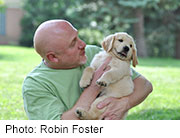- 7 Best Breads for Maintaining Stable Blood Sugar
- Gelatin vs. Collagen: Which is Best for Skin, Nails, and Joints?
- The Long-Term Effects of Daily Turmeric Supplements on Liver Health
- Could Your Grocery Store Meat Be Causing Recurring UTIs?
- Are You Making This Expensive Thermostat Error This Winter?
- Recognizing the Signs of Hypothyroidism
- 10 Strategies to Overcome Insomnia
- Could Artificial Sweeteners Be Aging the Brain Faster?
- Techniques for Soothing Your Nervous System
- Does the Water in Your House Smell Funny? Here’s Why
Vaccinate Puppies Against Parvovirus Before They Meet Other Dogs


It’s important to have your puppy fully vaccinated against parvovirus before going to the dog park or anywhere else your pup might encounter other dogs, an expert says.
Failure to take this precaution could prove deadly for your pet, according to Susan Nelson, clinical an associate professor of clinical sciences at the Veterinary Health Center at Kansas State University.
“Parvovirus — parvo — is a highly contagious virus that is something we do see year-round because it is always in the environment, but the Veterinary Health Center has been seeing more cases recently,” she said in a university news release.
“We usually see cases in young dogs, primarily puppies, that have had one vaccine as a puppy but didn’t complete the series or had no vaccines at all,” Nelson noted.
She emphasized that this is “a preventable disease, so it’s important when you have puppies to get them into your veterinarian starting around 6 to 8 weeks of age for their first vaccine of what is commonly known as their ‘puppy series.’
“Then they will need to get that vaccine every three to four weeks and receive their last booster around 14 to 16 weeks of age for the best chance of avoiding parvo and other diseases included in this vaccine series. They aren’t considered fully protected until a few weeks after that final dose at 14 to 16 weeks of age,” Nelson said.
During the vaccination period, you should avoid taking your puppy to city parks, dog parks, pet stores that allow animals inside, or any other place where there may be unvaccinated dogs.
The only exception is obedience classes. Socialization is critical for puppies and the risk of parvovirus is much lower in obedience classes because dogs must be vaccinated to attend. You can start taking your puppy to obedience classes one week after the first set of puppy shots, Nelson said.
You can also allow your puppy to get socialized by playing with friends’ or family members’ dogs that you know are up to date on their vaccines.
Parvo often begins with a fever and severe lethargy and depression. The dog then stops eating and begins vomiting, usually several times daily, Nelson said.
Profuse diarrhea, which is often bloody, then develops. The dog ends up extremely dehydrated. The virus destroys the lining of the intestinal tract, allowing bacteria to settle in and release toxins, according to Nelson.
“The only treatment is supportive care and intensive therapy. They are put in strict isolation because it is highly contagious to other dogs. Without any type of treatment, most infected dogs will die from the disease. And even with aggressive therapy, some dogs won’t make it. It can be very costly to treat them. Your best bet is prevention and keeping up with the vaccine series,” Nelson said.
More information
The ASPCA has more about parvovirus.
Source: HealthDay
Copyright © 2026 HealthDay. All rights reserved.










